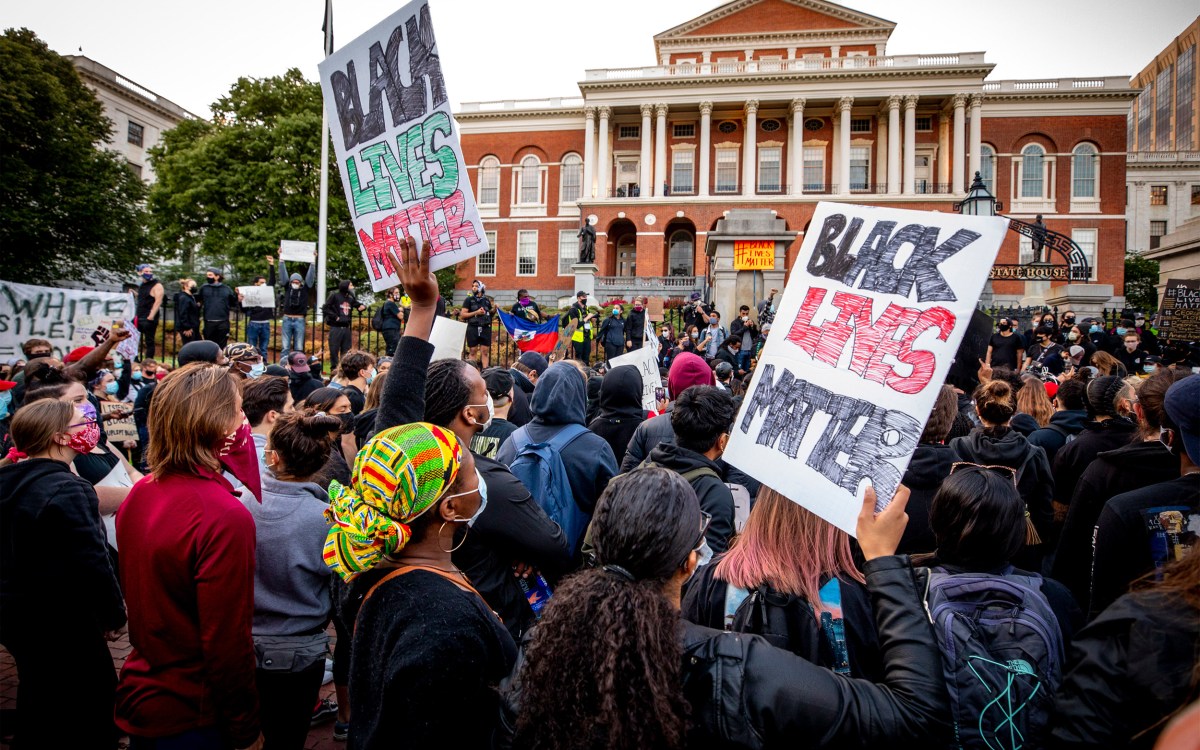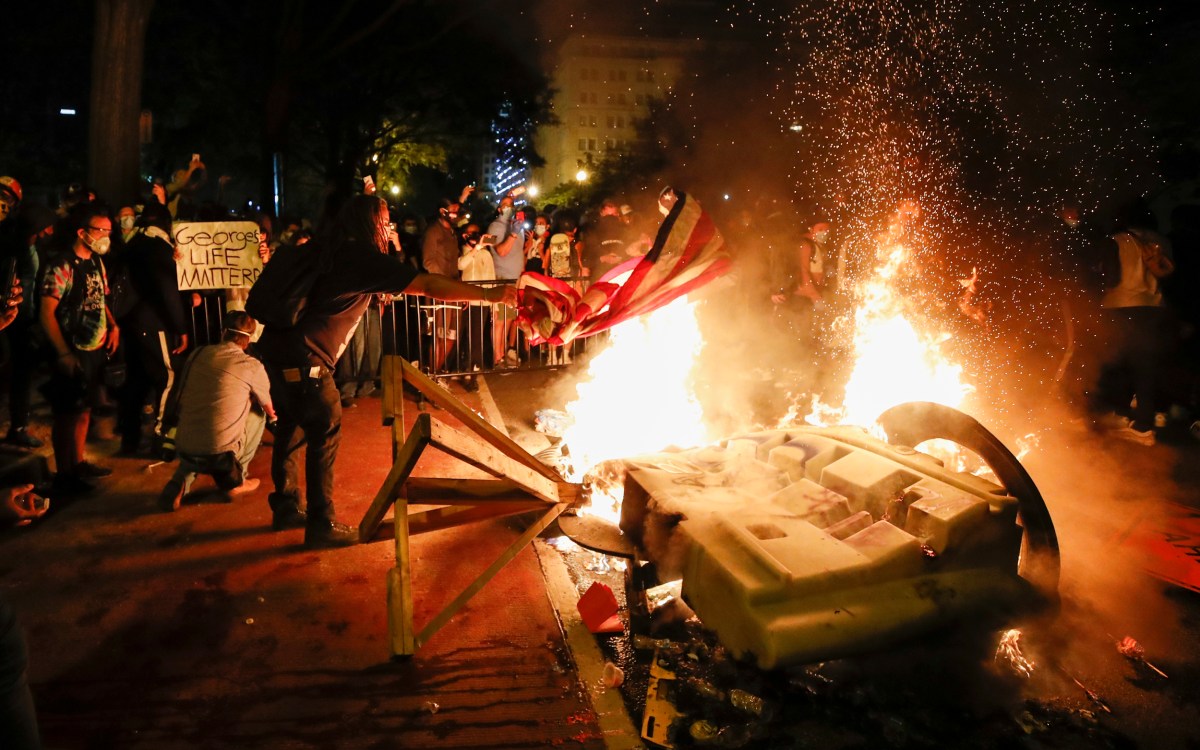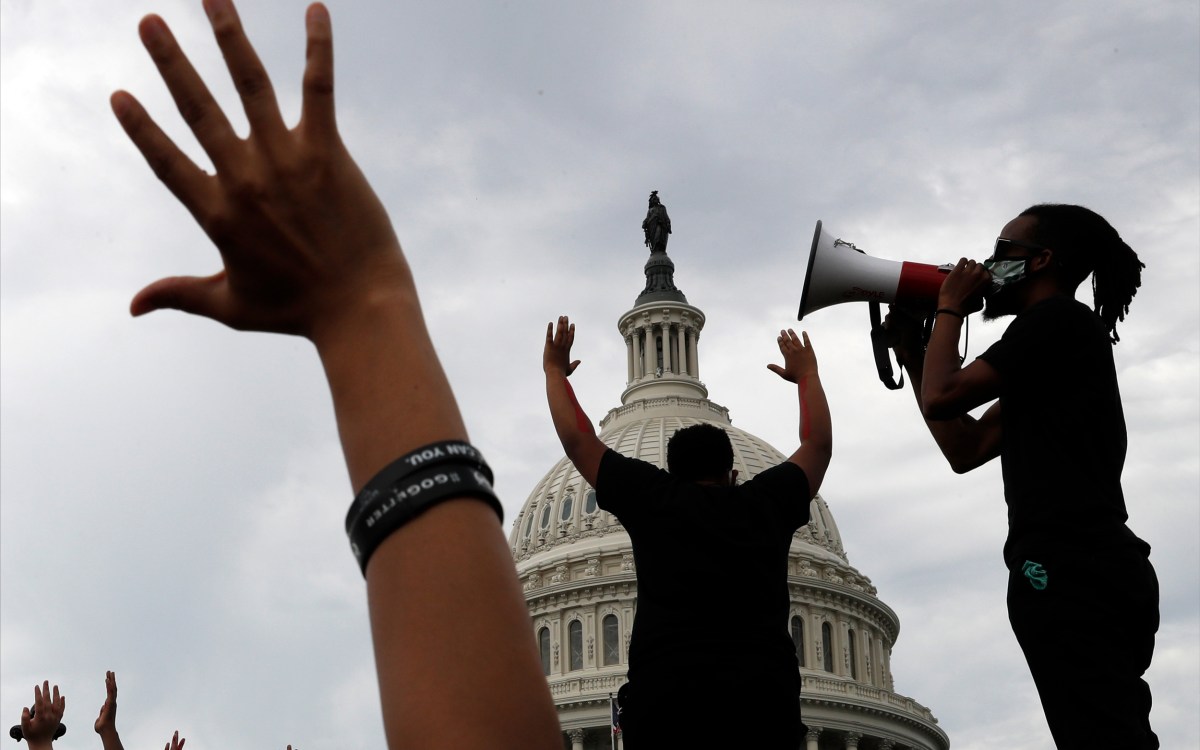
Photo by Asa Eckert-Erdheim and Cameron Hohimer/Harvard University
STEM takes a knee for reflection and reckoning
Departments shut labs, put down papers for a day to read, think, and discuss racial inequities and start devising concrete solutions in the fields
Harvard science shut down for a day of reflection and a kind of reckoning.
Faculty, staff, and researchers across the entire FAS Division of Science and the John E. Paulson School of Engineering and Applied Sciences (SEAS) closed their labs and put down their reports and results on Wednesday to educate themselves about racial inequities and lay the seeds for long-term action against systemic racism in the scientific community.
The work stoppage came in response to a national call from groups of scientists and specialists in diversity and inclusion who came together to organize the day under the hashtags #ShutDownAcademia, #ShutDownSTEM, and #Strike4BlackLives in the wake of the ongoing protests against the police killing of George Floyd.
“This is not a ‘Check the box, we did it, exercise,’ but rather, establishing an enduring, consistent, proactive role in the ongoing transformation of Harvard and the nation,” said Dean of Science Christopher W. Stubbs, who helmed a meeting with his leadership team in the morning to discuss steps the FAS Science could take as a whole, and convened another at the end of the day to collect the action items departments developed. “We need to build this into the fabric of our ongoing processes, assessing and holding ourselves accountable for progress in this domain just as much as any other.”
“It seemed to be the type of idea where we move from questioning what we can do [on a broad, big idea level] to thinking about practical types of things we can do [within our own departments] to eradicate systemic racism in academia … and STEM fields, where we know that we still have many opportunities to increase representation across a variety of the disciplines that are represented in the Division of Science [and in SEAS],” said Benita Wolff, FAS’ equity and inclusion administrative fellow.
“Taking the time to learn about these issues is critical. That’s the beginning of change, not the end.”
Peter R. Girguis
The actions proposed by the FAS Science and SEAS communities ranged from more K-12 outreach to address pipeline issues of minority representation in STEM to providing appropriate mentoring and support for people at all career stages, including students, postdoctoral fellows, junior faculty, and administrative staff.
Others items included internal assessments on departments’ cultures, adding to steps already taken by both FAS and SEAS — changing the way hiring committees find candidates so there is a more diverse pool, for example — and increasing accountability in these areas to make sure commitments to addressing racial inequities are met.
The steps came at the end of a day during which scientists and staff members thought and talked about how to deepen commitments to ending anti-black racism in academia and in STEM in particular. Some organized reading articles and books on engaging in anti-racism work. Other departments held town-hall-style meetings or smaller informal meetings to discuss similar issues.
Stubbs encouraged FAS’s science division to participate in a June 8 email, as did SEAS Dean Francis J. Doyle III in a separate email to that community.
“The past few weeks have been sobering on many levels,” Doyle wrote. “Events across the country and close to home have highlighted the ways in which racism is structurally embedded both in society at large and in our own institution. These are complex and existential challenges that demand our attention and collective action.”
For Peter R. Girguis, professor of organismic and evolutionary biology (OEB), the importance of self-education cannot be overstated.
“Taking the time to learn about these issues is critical,” Girguis said. “That’s the beginning of change, not the end. My biggest hope is people actually take the time to reflect on life in the United States of America and then how our experiences are so shaped by factors that we have no control over.”
“These are complex and existential challenges that demand our attention and collective action.”
Francis J. Doyle III
It’s something that Girguis has thought a lot about.
“I’m a person of color who, as an Egyptian American, has not lived the life of a black man,” he said. “I can tell you, though, that I’ve lived, in many ways, a very confusing life, especially as a kid. At any given time, I was identified with and then rejected from any number of different groups. People confuse me for being Cuban American or for Mexican or for Salvadoran or Spanish. I take the time to explain that to my friends and colleagues, but I think for a lot of people who haven’t lived that experience and haven’t taken the time to understand what it means to live that experience, there is an opportunity here to take a day to do that.”
Elena Kramer, the chair of OEB, invited faculty and staff to join her for an informal Zoom discussion to share their ideas for supporting diversity, belonging, and inclusion in the department, which included creating a hiring committee charged with actively scouting talent pools for promising female and minority candidates.
The staff at Harvard Forest repurposed three of its strategic-planning working groups on Wednesday and one on Thursday to develop specific actions it could take to eliminate racism in its own work, work it does with collaborators, and in neighboring communities. It came up with a long list of actions to take up by the end of the month, at the end of the summer, and through the fall and spring semesters, like researching minority-owned businesses in the area for potential capital projects and other service contracts.
“It’s a start,” said Aaron Ellison, a senior ecologist and Harvard Forest’s deputy director, who facilitated the meetings. “It’s a bunch of very well-meaning, [mostly] white folks trying to figure things out. The Harvard Forest has a long and challenging history of strong male dominance and strong, traditional New England white cultural dominance that is a very challenging environment for someone who’s not a white Anglo-Saxon Protestant from New England to work in.”
More like this
The Department of Stem Cell and Regenerative Biology refocused a morning faculty meeting on Wednesday to develop concrete steps, canceling all other meetings. Similar actions were taken in all other FAS Science and SEAS departments that weren’t involved in COVID-19 research.
The Physics Department called a special meeting on equity and inclusion, which attracted more than 200 participants to discuss how to increase the number of African American physicists.
“But what does this have to do with physics?” said department chair Subir Sachdev, the Herchel Smith Professor of Physics, in an opening statement to the faculty, postdoctoral scholars, staff, and undergraduate and graduate students who attended the session. “Not that long ago, physics used to be the domain of a very small, elite group of mostly European men (although, this was not so in the more distant past). Today, physics research is performed by a vibrant international community from all corners of the globe. … But while [diversity in] physics has been remarkably successful on an international scale, we must admit that it has failed domestically here in America, leaving many under-represented groups, and especially African Americans, out of this community [including at Harvard].”
It is time to change that, Sachdev said. Potential action items the department discussed were increased mentoring of incoming first-year students, especially those of color, and developing an academic enrichment program similar to the Math Department’s Emerging Scholars Program.
The Department of Chemistry and Chemical Biology hosted a two-hour town hall. Department members and students discussed potential steps like creating a summer outreach program, a mandatory bias training program, and partnering with FAS’ human resources office to remove names from staff position applications.
The department also announced a CCB Community Committee to keep people talking about the issue, have them come up with new actions items, and help keep the department accountable.
“We not only appreciate your perspectives; we need them,” wrote Deana Reardon, the department’s interim executive director and associate director of administration, in a note following the meeting. “Today was the first in a series of conversations meant to carry this momentum into tangible changes year after year.”
At SEAS, Alexis J. Stokes, director of diversity, inclusion, and belonging, hosted a women of color coffee break to provide a safe space for black women to honor Breonna Taylor and other black women who have been killed because of racism and police brutality.
“Having the opportunity to end the day discussing anti-black racism with women who share our lived experiences was therapeutic,” Stokes said. “We laughed; we discussed difficult topics; we shared hopeful moments from the day; and had space to just be who we are. We all concluded the session collectively saying, ‘We needed this.’”








